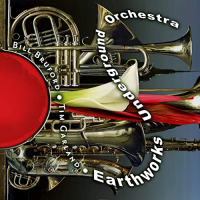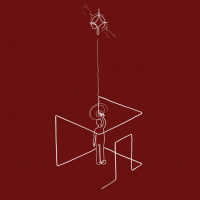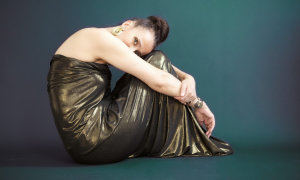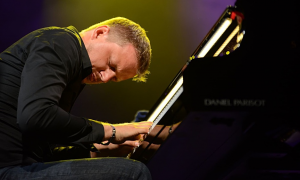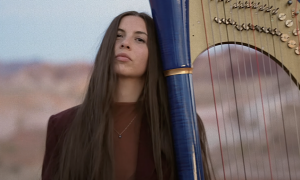Home » Jazz Articles » Interview » Marc Edwards: Free Jazz Drummer & Percussionist
Marc Edwards: Free Jazz Drummer & Percussionist
 ME: You've been doing your homework, Taran (Laughs). To continue with Apogee, I met my tutor, mentor and friend, Leonard "Lenny Nelson when Apogee played at the Boston YMCA. Lenny sat in the very first row in front of my drums. I recall dropping a drumstick at one point during the show. Lenny picked it up and gave it back to me. A police officer stood outside the room. Lenny told me the police officer would come in and listen for a few minutes, and then he would walk out of the room shaking his head. He didn't understand the music we were playing. I had seen Lenny on the streets or coming out of bookstores before I started working in the Combat Zone. We would always say hello to each other. At the time, I didn't know he was an exceptionally talented musician. Lenny felt that when I played with Apogee, I was the right drummer for the band. "Marc, when you're on your own turf, no one can touch you. You are a king in that band!
ME: You've been doing your homework, Taran (Laughs). To continue with Apogee, I met my tutor, mentor and friend, Leonard "Lenny Nelson when Apogee played at the Boston YMCA. Lenny sat in the very first row in front of my drums. I recall dropping a drumstick at one point during the show. Lenny picked it up and gave it back to me. A police officer stood outside the room. Lenny told me the police officer would come in and listen for a few minutes, and then he would walk out of the room shaking his head. He didn't understand the music we were playing. I had seen Lenny on the streets or coming out of bookstores before I started working in the Combat Zone. We would always say hello to each other. At the time, I didn't know he was an exceptionally talented musician. Lenny felt that when I played with Apogee, I was the right drummer for the band. "Marc, when you're on your own turf, no one can touch you. You are a king in that band!
Lenny also hung out with Milford Graves during the sixties one summer. I heard Milford talk about Lenny during a radio interview on Columbia University's WKCR. Milford Graves and I are the only two drummers who talk about Lenny Nelson. Many well known jazz drummers either know Lenny personally or have heard of Lenny, yet they refuse to talk about him. What's up with that? Lenny knows more about jazz drumming than any drummer I've met. He also played in the Combat Zone at a club across the street called The Piccadilly. I had the chance to see Lenny in action on many nights. I got off from the Two O' Clock Lounge in the evening. Lenny didn't start working at the Piccadilly until 8 PM. I would head back downtown and hang out with Lenny. We would talk about drums during his breaks. Sometimes Lenny would let me play a set. I did fill in for him when Lenny needed to take time off. The ladies at this club were more mature than some of the ladies at the Two O' Clock Lounge. I was interested in one young lady at the Piccadilly. I later learned that she made an adult film after I had moved back to New York. Had I dated her, my life would be very different today.
We would head for the Jazz Workshop after he finished for the night. Lenny would secretly record the set and we'd sit in his car while he would break down what Elvin and other drummers were doing. Lenny has a keen musical ear. He can figure out what drummers are playing. This process would go on for hours. We'd go to his car and finish talking around two, three, or four in the morning. I didn't have to report for work until 2 PM. I would sleep late the next day. I had studied with Alan Dawson, but it was Lenny Nelson who rounded out my sound. This was similar to taking a rough marble sculpture, polishing it, and making the image more attractive.
My sound continues to grow and evolve and some of that credit belongs to Lenny Nelson. He's one of the great drummers in the Boston area. He once told me that when he retires, he plans to start teaching. I hope the Berklee College of Music adds this man to their staff when it is convenient for Lenny. As I said before, I've never met anyone as knowledgeable about the drums as Lenny Nelson. That will be a great day in Boston when that happens. I also met drummer Bobby Ward. Bobby's drumming is a reflection of his personality. He talks fast and plays drums very fast in the Buddy Rich sense of the word. He was hanging out with Lenny and some of the others drummers who worked at the other clubs in the Combat Zone one night. It was a rare gathering of most of the drummers working in the Combat Zone. The Combat Zone was Boston's equivalent of 42nd Street during the sixties. There were lots of sex clubs along Washington Street. That's how 42nd Street area used to be until city officials decided to clean up the theater district. Some of the hookers would hassle theater goers as they were leaving the shows. That was the last straw and 42nd Street began changing from that day forward.
Bobby demonstrated something that he likes to play. Bobby showed us, but he played it at the speed of light, super fast. No one could pick it up. Harvey, a white drummer from Canada, had the courage to ask Bobby to play the figure at a much slower speed. "Slow it down Bobby. Bobby complied, but it wasn't enough. "Slow it down some more Bobby, and we were able to get it. I have since forgotten that particular rhythm since I wasn't able to incorporate into what it is that I'm doing in free jazz. Bobby Ward remains active on the Boston scene today and I think he writes some of pieces for the band he's working in. I have one of his albums in my CD collection. He works with saxophonist flutist Henry Cook frequently in the Boston area.
It is very important for musicians to continue increasing their knowledge about the instruments they play in public. I maintain contact with Lenny Nelson even to the present day. We haven't spoken in a long time, so, he's due for another long phone call. Whatever success I enjoy in this lifetime will be due to Lenny Nelson's influential drumming concepts. I can apply some of Lenny's concept easily into free jazz. I hope he gets recognition on some level before he dies. He is one of the true unsung heroes in jazz. Lenny also studied with Alan Dawson. I'm also intrigued by master frame drummer Glen Velez's mesmerizing work. His studies have been very useful improving my drumming; however, I don't think I will get into the frame drum as is the case with Hamid Drake. I want to master the drum kit, plain and simple.
After Gene Ashton left Apogee, we did try other musicians while we were in New York City. I recall William Parker doing a rehearsal with us. I was playing a particular idea which I noticed seemed to throw William off. After the rehearsal, I told David, I should have asked William, if what I was playing was messing with his head. David had a good laugh when he heard this. He couldn't stop laughing. We also had trumpeter Arthur Williams for a rehearsal or two. We settled on trumpeter Raphé Malik. class="f-right"> Return to Index...
David S. Ware and Sonny Rollins
AAJ: I hear that David S. Ware and Sonny Rollins are great friends. Can you shed more light on this?
ME: David has a long standing relationship with Sonny Rollins. David talks about this in an All About Jazz interview. As I recall it, David met Sonny Rollins when he was a young boy. He followed Newk's career. At one point, they got together in a rehearsal room and played together. Just the two of them playing the tenor saxophone. I have heard the cassette tapes and you could hardly tell the difference between David S. Ware and Sonny Rollins. Their relationship goes back a long way, covering many years. This relationship is the reason Newk allowed Apogee to open for him at the Village Vanguard. I don't know of any other free musician that has a relationship like this (with a well known inside player). It's too bad Newk's busy schedule keep them from making an album together. That would be interesting.
AAJ: Yeah that'd be great. Could you describe the gig at the Village Vanguard?
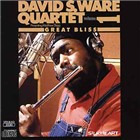 ME: I was always in awe of Sonny Rollins. He's worked with many of the key figures in jazz. I arrived early since I had to setup my drums. When David arrived, I told Newk, "David's here. Newk was sitting down warming up on his horn. I touch him gently on his knee. Newk acknowledged but kept on playing. "He's totally into the music, I thought to myself. David, Gene and I really put on a show. Most of the members in Newk's band, save one, dug what we were playing. Ntozake Shange came and she wanted to read her poetry. David told her no. She and David fell out after that. There was a big misunderstanding. I have no idea how that happened. Shange went on to write a very successful play that ran on Broadway. The name of the play was For Colored Girls Who Have Considered Suicide/When the Rainbow Is Enuf .
ME: I was always in awe of Sonny Rollins. He's worked with many of the key figures in jazz. I arrived early since I had to setup my drums. When David arrived, I told Newk, "David's here. Newk was sitting down warming up on his horn. I touch him gently on his knee. Newk acknowledged but kept on playing. "He's totally into the music, I thought to myself. David, Gene and I really put on a show. Most of the members in Newk's band, save one, dug what we were playing. Ntozake Shange came and she wanted to read her poetry. David told her no. She and David fell out after that. There was a big misunderstanding. I have no idea how that happened. Shange went on to write a very successful play that ran on Broadway. The name of the play was For Colored Girls Who Have Considered Suicide/When the Rainbow Is Enuf .
Max Gordon kept flicking the lights off and on, trying to get us to stop, but we kept on playing regardless. Max Gordon would do the same when David and I would join the Cecil Taylor Unit a few years later. When we started our set at the Vanguard, I began playing very loudly. Sonny Rollins immediately got up and went into the kitchen. After our short set, I was sweating very profusely as I entered the kitchen. A musician was talking to Newk. Both men seemed very pleased with our playing. Our eyes met while I was changing T-shirts. I said to Newk, "It's hard work to play this music. "That's what it takes, was Newk's reply. class="f-right"> Return to Index...
AAJ: Max Gordon kept flicking the light off and on? He did this when you were with Cecil Taylor?
ME: Yes, here's what happened when Cecil Taylor and company played at the Village Vanguard. Cecil had taken the band to dinner at a restaurant not far from the club during the middle of the week. When we entered the club, everyone in the band was in a mellow mood. The mood carried over into our playing. We weren't playing very hard that night until I felt two eyes bearing down on me. I looked up and it was drummer Billy Hart in the audience checking me out. He was smiling because we had talked for years, and finally he was seeing me play with Cecil. Because Billy Hart was in the audience, I decided, I had to show him what I could do. I wanted to make a good impression as I had followed Billy Hart from the time he was with Pharaoh Sanders [the Karma album], to Herbie Hancock and other bands. I began to increase the tension and before you knew it, the band was on fire. We played a good two hours and a half or it could have been slightly longer. Max Gordon was flicking the lights off and on trying to get us to stop. We kept on playing and playing. This was the first set mind you. A member in the audience said we had played for close to three hours. The times varied depending upon who you talked to, but we had no idea we were on the bandstand for that long. I thought the set lasted for an hour-and-a-half.
The week that we played at Village Vanguard, I recall seeing, Tequila, the young lady who worked with Tony Williams as a singer. She was there the entire week. For this reason, after I had left Cecil Taylor, David told me that when they returned to the Keystone Korner in San Francisco, Tony Williams was in the audience. Beaver Harris was the drummer with the Cecil Taylor unit that week. I believe Tequila had told Tony about me or it could have been the word of mouth from other musicians.
I saw Billy Hart again during a music series at Sweet Basil's. It was called Our Friends from... followed by the name of the country. It would vary during this jazz series. On this afternoon, it was Our Friends from Canada. Don Pullen played piano, Billy Hart on drums, Jane Bunnett on soprano saxophone, and a trumpet player. It may have been her husband, Larry Cramer. When Billy saw me come into the club, he started playing some of my musical ideas. During the break, he said, "Marc, this is your gig. You should be playing in this band. I laughed and told Billy, "No, you are the right man for this gig. I noticed that Jane Bunnett released a CD, Live at Sweet Basil on the Denon label. I'll have to look into it and see if it contains the band I saw at the club. I hope so. Don Pullen did an incredible performance, playing extremely well throughout from the first note to the end of the session.
I hear too many players today and they don't have a firm sense of direction. We had that and much more. I explain this point a great deal more when I'm conducting a free jazz workshop. I once sat in with Sabir Mateen's workshop. Through the Apogee rehearsals, this is how we met Raphé Malik: Raphé heard us rehearsing at a space right across the street from the New England Conservatory. He was walking down the street and he heard what we were doing. He came upstairs to the second floor and started checking us out. Months later, Raphé joined Apogee after we moved to New York City. He replaced Gene Ashton after he left the band. We had played our first gig at the Studio Rivbea and Ashton walked out on us. David and I couldn't believe our eyes when we saw him leave the room. Gene's departure caught us completely off guard. We weren't prepared for this. The band was never the same without him. We had spent quite amount of time playing together, I found myself missing his sounds whenever we'd do a performance.
Readers might find these comments, from Rick Lopez's site, of interest:
"Chris Amburger did perform with Apogee, however, for the record, the band developed largely without a bassist. This had an enormous impact on my drumming. The times that Chris performed in public with Apogee were rare. While we were in Boston, bass players were always in demand. For that reason, Chris was unable to remain with Apogee as a permanent member. We were glad to see him make a few gigs with the band on those rare occasions. Raphé Malik heard Apogee in Boston while we were rehearsing across the street from the New England Conservatory. He can confirm that David, Gene, and yours truly, spent most of our time together as a trio, not a quartet."
The band did play at Columbia University's WKCR two times. The first time, we hit as the original trio, Apogee. The second time, bassist Chris Amburger played with us. Chris told me his last name is the word hamburger without the "h. I've had the opportunity to hear this version of Apogee for the first time on CD. Someone gave me a copy of this performance recently. I only hope that David S. Ware and Cooper-Moore can concentrate on obtaining the Apogee tapes that they have, that is if they still have them in their possession, and put them out on CD also. There is an audience for this music. Most of the places we performed in Boston were colleges, churches, café, one in particular, the Black Avant-garde. Many new upcoming artists played at this venue. Justo Almario [tenor saxophone] and Sid Simmons [piano] are a couple of the musicians I recall seeing at this club. We also played one time at the Boston YMCA. That performance was recorded. I hope David and Cooper-Moore can get that out on CD too.
More from Rick Lopez's site:
"As you already know, we rehearsed extensively as a trio. This helped us to develop musically on all levels."
"The only tape of Apogee that I know of was done by David and Cooper-Moore. I'll have to try and find the flyer, but, I can tell you that it was a performance in Boston, at the YMCA. Either David or Cooper-Moore has the tapes. The next tape, a studio recording, became the Birth of a Being record on the then new HatHut record label. If there are any other tapes, they're unauthorized recordings."
"During the early 1970s, while still living in Boston, we came to New York to play at Columbia University's radio station, WKCR. I don't recall the year we did this. Reel to reel tapes recorded Apogee live on the air. We did not talk nor do an interview. Most of the feedback that we got was that we didn't talk. It seems listeners were more interested in hearing us speak than the music. The personnel was David S. Ware, tenor sax, Gene Ashton, piano, and yours truly on drums... A fan tells me that there are two tapes of Apogee at Columbia University's radio station WKCR. They may confirm my hunch that we played there a second time." class="f-right"> Return to Index...
AAJ: Can you describe your musical development as a free drummer, how did you develop your sound?
ME: The direct effect of not playing with a bassist on a regular basis is that my musical concept is different from most drummers. Most drummers learn to play music in more traditional settings meaning drums, piano, bass and horn. I never had that except for the time I was attending Berklee. By not having a bassist to work with during my developmental phase, my drumming went off in a different direction. Had I learned music in a traditional setting, my playing would be more conservative. I describe what I do as similar to a wild stallion. No one will ever be able to ride this horse!
My concept, the way I play the drums, I tend to fill up the space. When you have a piano in the group, the band can get lazy because the piano fills the space. When your pianist leaves, you'll feel the difference immediately. My drumming is one of continuous sounds. That's how I hear the music and it comes through that way. I really don't have much say about it. We're all different, drummers in general, and that's as it should be. I fail to understand why some musicians choose to make a career out of living off another musician's style. As I mentioned earlier, I found my sound when we did a live performance in Boston on a college radio station. We also did a performance at a college in the Kenmore Square area. I understand that the guy who directed it has the video tapes in his possession, according to Larry Sands.
AAJ: Can you describe the activities at 501 Canal Street?
ME: When we moved to New York, we began rehearsing at the space, 501 Canal Street. This space would never have worked if it were not for the extraordinary home improvement skills of Cooper-Moore. He did a majority of the repair work on the building and made it easier to live at this location. Other musicians such as Tom Bruno, and Ellen Christi came, but that was after the fact. Alan Braufman was one of the original tenants in this building along with Cooper-Moore, David S. Ware and Chris Amburger. We began rehearsing here also, the same as we did in Boston. Gradually, we began to run into Cecil Taylor.
Cooper-Moore did an excellent interview about the early years of Apogee and the formation of the activities at 501 Canal Street. Try to get in touch with Adam Lore for a copy of 50 Miles of Elbow Room, issue one. See Rick Lopez's site provided at the end of this bio. Readers will want to read this interview. Cooper-Moore's storytelling skills are much better than mine.
AAJ: How did Apogee happen to play with Cecil Taylor's band?
ME: David was a huge fan of Cecil Taylor. I never felt that we had to play with a big name jazz figure, however, I'm not stupid. Should the opportunity arise, we would take advantage of it and go with the flow. We would have discussions about this while we were in Boston at the end of rehearsals or sometimes in the middle of a rehearsal session. Cecil eventually asked David and me to play in a large ensemble he was putting together. We had talked to Cecil over a period of weeks and months. When he called a rehearsal, I think he was shocked that David and I could play. Cecil once came to my job when I was working at a bank on Chamber Street. I recognized him right away. He got on line and came to a coworker. I went over to her, and said, "Don't you know who this is? She didn't. "He's Cecil Taylor.
Cecil was pleased to see that someone knew who he was. I told him that David was trying to get in touch with him. Cecil quickly jotted down his number on a small piece of paper and gave it to me. I gave it to David at the next Apogee rehearsal at 501 Canal Street. From this initial contact, David and I would run into Cecil on many other occasions in New York City. We did see Cecil whenever he played in New York. We attended his gigs at Columbia University, the Five Spot, and the Whitney Museum.
Most musicians talk and can't play. We were very strong during the seventies. Nobody could out do us when it came to playing high energy music. They'd get tired and have to sit down and rest. We had done that so much in Boston that we created a name for ourselves on that alone. Apogee was more than a high energy band. We could play other musical styles and we did on occasions demonstrate that to the public.
AAJ: When did you meet Jimmy Lyons?
ME: After attending Cecil's Big Band rehearsal, Jimmy Lyons came down to the second or third one and checked us out. When the rehearsal was over, Jimmy sat down on the couch and listened to David and me playing high energy music. He was smiling the whole time. I went over to Jimmy and talked with him for a few minutes. The rehearsal was held at a musician's home. I believe it was tenor saxophonist Craig Purpura. I think he had studied with Cecil at one of the colleges. I'm not sure which one. Craig had a loft on Chamber Street. The rent was low during that time period. Later, the rent increased. This ended the loft scene which many artists for a short time enjoyed having performances and other activities in their homes.
At the end of one of the rehearsals, I remember Craig putting on "Respect, a song by Aretha Franklin, on his stereo and dancing to the music. Craig did come to see us when we played at the Village Vanguard. He brought his horn and politely asked Cecil if he could sit in. Cecil told him no. Very few horn players could handle that version of the Cecil Taylor Unit. I had to tell David that Jimmy was very down to earth and that he should try to talk to Jimmy. I told David, he's not stuck up like some of the so called jazz stars. I told David, "Jimmy is real. He's not a jackass like some of these folks out here. David did speak to Jimmy at the next rehearsal.
There were many musicians in that large ensemble. The program did not list the names of the musicians in the ensemble. Many years later, the names were put on the Internet specifically by Rick Lopez, with help from various individuals including yours truly, at his David S. Ware Discography/Sessionography site, however, I can neither confirm nor deny who those musicians were. Too much time has elapsed and I can't remember their names. I also don't recall the band playing at the Village Gate. I would remember something like that. I did see David S. Ware and company at this location when Beaver Harris joined the band. Anthony Braxton was playing opposite them the night I came down.
I can't praise Jimmy Lyons enough. He was very supportive and encouraging of my musical approach. I would tell him I'm not able to do this, and I'm having problems doing something else. Jimmy would calmly say, "You're already doing those things, Marc. That would force me to pause and I'd have to change my thinking. I was holding myself back with negative thinking and being unnecessarily critical of my playing. Jimmy was very helpful in this respect. He did ask me if I wanted to do any playing after I had left Cecil, but I was going through personal stuff. My head was not into music. Had I not been going through that period, Jimmy wanted me to play in his band. How I regret missing that opportunity.
From Rick Lopez's site, I wrote:
"I was one of the drummers in that show. Fellow free jazz drummer Rashied Bakr was also there playing traps. As per Cecil's instructions, we each took turns playing congas and a variety of other instruments that were on the far side of the stage during the concert. Andrew Cyrille did not play traps. He played tympani and small percussive instruments. Dave Saphra was in the bass section along with William Parker, Sirone & Earl Henderson. Frank Lowe did make some of the rehearsals, but, he didn't play with the band at Carnegie Hall. About a month before we actually did the performance, there was a large influx of new musicians that joined the already large ensemble. Since our names were not printed in the program, it's tough to recall many of the fine musicians that were on the stage that night. My apologies to those that I'm unable to remember."
From here, we did the concert at Carnegie Hall. I remember as soon as we started playing the entire audience got up and left. Only a few hardy souls stayed to hear the music Cecil had written. This was an all star ensemble, the likes of which we may never see again. Marvin Hannibal Peterson on trumpet, Sirone, William Parker, and Dave Saphra on bass, Charles Tyler on baritone sax, Sunny Murray, Rashid Bakhr, yours truly on drums, Andrew Cyrille on kettledrums, Karen Borca on bassoon, Jimmy Lyons on alto sax, Raphé Malik on trumpet, Sharon Freeman on French horn, Carla Poole on flute. I had met Sharon Freeman when I played with the All City High School Band. Tenor saxophonist Frank Lowe did attend the rehearsals early on, however, he stopped coming. I wish he had continued attending the rehearsals. We played the lines so many times that even if a musician couldn't read music that well they would have picked up on the lines due to constant repetition. Cecil would give out the lines and then he would ask the band to play them. "Again. "Again. "Again. Always, Cecil would say "again and the band would repeat the lines over and over. I hear that there is a tape of the ensemble from the Carnegie Hall performance floating around however, I have never heard it. I hope someone will forward a copy some day on CD.
While we were rehearsing for Carnegie Hall, Apogee was playing regularly at Sam Rivers' Studio Rivbea. This was the place to hear free jazz during the early seventies. From doing so much playing, this was why David and I were so strong. Steady work will help any artist to improve their talents.
AAJ: Can you provide more information about the Studio Rivbea?
ME: Sam Rivers had a space called the Studio Rivbea in the Village on Bond Street. What was nice about it was that if you wanted to play there, you only needed the recommendation of a musician. There were no tapes or records to be submitted. It was strictly word of mouth from another musician. The reason tapes, CDs are needed today is because most people don't know the music. Granted there is an increase in the number of musicians and bands on the scene. I feel that we have to submit these things because you have a lot of uninformed individuals out here who don't know the music. Years ago, I talked to a club owner about getting work for my band and he told me, I would do better if I hire so and so, and so and so. He really knew the scene. Most people in the music business don't even know the local scene in their own neck of the woods. It's a terrible situation.
AAJ: Fascinating. Let's get back to Cecil Taylor. What happened next?
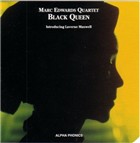 ME: From our experience in the large ensemble, Cecil was impressed with our talents that he asked David S. Ware to join his band, the Cecil Taylor Unit. I was busy at my job when I got the call from Cecil. He asked that I join his band also. I eagerly joined and the Unit was complete. I was unaware that Cecil had asked Raphé Malik to join the Unit also. Before joining the Unit, we (Apogee, David S. Ware, Raphé Malik and yours truly) did perform the music for Adrienne Kennedy's avant-garde play, A Rat's Mass. A review of this event can be found in the New York Daily News, Tuesday, March 6, 1976. The short article was written by Ms. Patricia O'Haire. We did several performances at the La Mama Experimental Theater in the Village. Ms. Eileen Stewart still runs this venue today.
ME: From our experience in the large ensemble, Cecil was impressed with our talents that he asked David S. Ware to join his band, the Cecil Taylor Unit. I was busy at my job when I got the call from Cecil. He asked that I join his band also. I eagerly joined and the Unit was complete. I was unaware that Cecil had asked Raphé Malik to join the Unit also. Before joining the Unit, we (Apogee, David S. Ware, Raphé Malik and yours truly) did perform the music for Adrienne Kennedy's avant-garde play, A Rat's Mass. A review of this event can be found in the New York Daily News, Tuesday, March 6, 1976. The short article was written by Ms. Patricia O'Haire. We did several performances at the La Mama Experimental Theater in the Village. Ms. Eileen Stewart still runs this venue today.
When Cecil hired us to play in his band, he in effect hired the Apogee band without Gene Ashton. While we were on the European tour during the summer of 1976, she attended the show when we performed at La Rochelle. I saw her back stage during our performance. I was really in the zone during this show. I sounded great that day. I could no wrong during this performance. Stewart was closely watching, taking it all in. At one point during the show, I went offstage to let Cecil take a solo. I needed to cool off for a few minutes. Stewart approached me and asked me to tell Cecil that she was there. I told her, "I'd gladly do that, but, I don't know who you are. When she said her name, I told her, "Cecil speaks highly of you. Can you stay longer? He's been telling us that you are somewhere in Europe. She had to leave, but I did give Cecil her message.
Here's what I wrote Rick Lopez a while back on this topic:
"Adrienne Kennedy's A Rat's Mass could be considered a prelude to my entering the Cecil Taylor Unit. I believe that Rashid Bakr was the drummer whom I replaced. By the time I arrived at the rehearsal space, the play was already intact, meaning everything was set. Cecil played kettle drums or tympani while I was on the drum kit. During the play, I began playing loudly. Cecil leaned over and whispered, 'Keep it down.' Immediately, I dropped to a softer dynamic level. There were no problems with dynamics from that moment on.
Raphé later shared that whenever I would play something, David [S. Ware] would start laughing. At this point, I had been working hard at my day job. I hadn't played in public for a while. The play was a different experience. I would love to work in that environment again. I'm not sure how many nights we performed at the LaMama Theater. Most likely, we did do at least two nights, with the possible addition of a third night. I'm unable to say for sure.
I also wrote about another performance in Europe:
"What's note worthy about the La Rochelle, France show is the addition of bassist, Alan Silva. Alan joined the band for the Montreux show in Switzerland on July 9, 1976. The band was rehearsing in a secluded area. It turned out to be not so secluded. One lucky fan heard us playing. He came in and sat down for a free concert. Alan Silva arrived minutes later. We continued to play with much passion. I turned it up an extra notch or two, just to see how Alan would react. Alan began playing; adjusting his musical ideas with what the band was playing. My reaction was that Alan was thinking that I was going to get tired and change to an easier level. That didn't happen! I kept playing harder and harder. Alan was checking me out closely. I kept playing so hard that Alan started laughing. Cecil was also highly amused by my tactics. He knew what I was doing.
Drummers tend to be very territorial. If anyone joined the band, I made sure that they played out stuff. On that point, there was no compromise. For the record, Alan Silva was the only musician to play with the Dark Unto Themselves Cecil Taylor Unit. No one sat in at any time. If you hear otherwise, it didn't happen while I was there. Anything is possible after I left.
This brings us to the La Rochelle performance in France, the next day we flew in a private plane. The plane was small, having just enough room for us, the musicians, and our instruments. We took only a change of clothes for one day. Our suitcases arrived later that day. I was uncomfortable in the plane. Raphé and I were in the back seat. My drum case contained the floor tom tom and the small tom tom. The case rested on our laps pressing against our faces. It was quite large. Had the plane gone down, there was no way for Raphé nor I to save ourselves. We were pinned to the back seat by my drum case. We were totally in the hands of the Almighty. Luckily, we arrived at La Rochelle without any mishaps.
Jimmy and David were laughing at us throughout the flight. They teased us to no end. After the plane landed, we were taken to the hotel. We were late getting to La Rochelle. The promoters of the concert wanted us to go to the theater ASAP. I was hungry. I didn't want to make the same mistake I had made at the Montreux Festival. During the show, I suddenly found myself very hungry. Getting hungry in the middle of a performance is awful because you can't do anything about it. You can't leave the stage while the band is playing to eat. That's a no-no! I went to David's room and told him that I had to get something to eat before we played. David took me to Cecil's room and explained the situation. Cecil understood. Within a short time, we were at a restaurant eating a lavish meal. Meanwhile, the promoters were having a fit. The show was not going to start on time. As soon as I had finished eating, the promoter, personally, drove me to the theater pronto.
I don't recall the name of the place. It was a large theater that could also double for showing movies. When I had finished setting up my drums, Cecil, Jimmy, David and Raphé arrived. We did a quick sound check. I could hear a concerned crowd behind the curtains. They were greatly relieved when the curtains went up. Finally, they were going to hear some music. The tape doesn't fully capture my performance. At the beginning, I was using brushes. On this day, I was in the zone. Everything that I played was superb. Jimmy Lyons turned around at one point because he was so impressed with my work on brushes. Later, I changed to drumsticks and the band took off. Alan really added another voice to the unit. I wish he had stayed on longer with the group. Listening to the tape, the band sounds great.
Towards the end of our long set, Jimmy, Raphé and David started playing together. This is one of the few times that the three horns improvised freely, other than when they were playing the heads. They kept playing on and on, I thought they would never stop. During this segment, Cecil thought that I was pushing the band. No, it wasn't me, it was the horn players. They had gotten into a hard driving mode and locked in. I had no choice but to keep up. That was no problem. I simply dug in and started to push the group as hard as I could. When we finished playing, the audience was very enthusiastic. They kept screaming and hollering. We bowed and left the stage. Because I had played so well, Cecil asked me to go back on stage by myself. I didn't want to, but, Cecil insisted. As soon as I set foot on the stage, the audience went nuts! They started screaming again, only this time, their collective voices went up another octave. Words cannot begin to describe how I felt at that moment. Now, I understand why people cry when they receive awards at the music awards shows. The audience can literally move a person to tears."
Tags
PREVIOUS / NEXT
Support All About Jazz
 All About Jazz has been a pillar of jazz since 1995, championing it as an art form and, more importantly, supporting the musicians who make it. Our enduring commitment has made "AAJ" one of the most culturally important websites of its kind, read by hundreds of thousands of fans, musicians and industry figures every month.
All About Jazz has been a pillar of jazz since 1995, championing it as an art form and, more importantly, supporting the musicians who make it. Our enduring commitment has made "AAJ" one of the most culturally important websites of its kind, read by hundreds of thousands of fans, musicians and industry figures every month.



